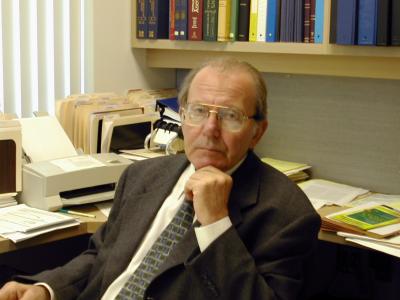December 2, 2004
Stamatoyannopoulos appointed to Motulsky professorship
Dr. George Stamatoyannopoulos, head of the UW Department of Medicine’s Division of Medical Genetics, has been appointed the first holder of the new Arno G. Motulsky Endowed Professorship of Medicine. Stamatoyannopoulos is a professor of medicine and genome sciences, adjunct professor of pathology, and director of the Markey Molecular Medicine Center. The new endowed professorship was established in honor of Arno G. Motulsky, professor emeritus of medicine and founder of the UW Division of Medical Genetics.
A native of Greece, Stamatoyannopoulos received his M.D. and D.Sc. degrees and postgraduate training at the University of Athens and came to the UW as an instructor in medicine in 1964. In 1987 he became director of the Molecular Medicine Program and in 1989 he was appointed head of the Division of Medical Genetics.
Stamatoyannopoulos investigates the control of human globin genes during development, new treatments for sickle cell disease, and the development of somatic gene therapy for ß chain hemoglobinopathies.
He is the editor of The Molecular Basis of Blood Diseases, as well as numerous conference proceedings, and a member of several editorial boards. He is a fellow of the American Association for the Advancement of Science and past president of both the American Society of Gene Therapy and the American Society of Hematology, and has received numerous national and international honors and awards. He has been recognized at the UW as a Distinguished Teacher and earlier this year was elected a fellow of the American Academy of Arts and Sciences.
Last year Stamatoyannopoulos received a three-year $6.9 million grant from the National Human Genome Research Institute (NHGRI) for his participation in the ENCyclopedia Of DNA Elements (ENCODE) project. This is a new worldwide effort to identify all functional elements in human DNA — to create a “parts list” for the body. This knowledge is necessary to fully utilize the known DNA sequence to predict potential disease risks and to develop new therapies to prevent and treat diseases. The UW group will study the large-scale application of existing technologies for determining functional elements.
He also holds an $11.3 million, five-year program project grant, “Stem Cell Gene Therapy for Hemoglobinopathies,” from the National Heart, Lung, and Blood Institute. This program, with six projects and four core units, seeks to develop new and safe approaches for general and stem-cell gene therapy for the beta-chain hemoglobinopathies, in particular sickle cell anemia and homozygous beta-thalassemia.

